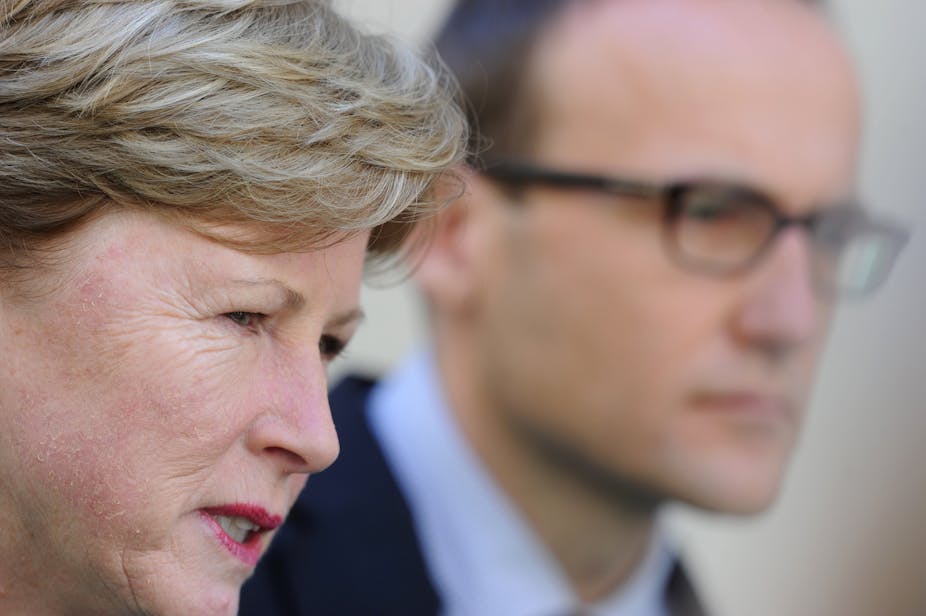When explaining the recent departure of six senior members from her 16-strong office, Christine Milne, the parliamentary leader of the Australian Greens, dismissed this as a fairly routine occurrence.
However, the mass exodus of staff from the office of the leader of a party is rarely without consequence in any workplace, let alone a political office.
In political offices, staff churn can be caused by a number of factors and events.
As Milne herself has been at pains to point out, there is a higher incidence of resignations from political offices in the aftermath of an election. Long and hectic working hours, and a Canberra-based location, can take a huge toll on the personal life of political staffers.
Then there are other less innocuous reasons that can precipitate a rash of departures. These can be triggered by staff discontent over disagreements about a leader’s strategic focus. It might indicate rancour and distrust between the leader and certain personnel, particularly when the workforce was inherited from the previous party boss. It can also signify a growing view among staff that there are fewer opportunities for advancement because the leader’s future is uncertain.
Whatever their reasons for quitting, the resignation of more than a third of Milne’s staff has proven to be a public relations problem for the Greens leader. In addition to representing a substantial drain of political expertise and skills from her office, the departures have exposed Milne to speculation that moves are afoot from within the party room (supported by sections of the upper echelons of the party organisation) to unseat her from the leadership.
While leadership uncertainty and backroom party machinations are never a good look for a party, it comes at a particularly difficult time for the Greens in light of its recent electoral performance.
Notwithstanding the fact that the Greens potentially increased its parliamentary team by one (at the time of writing Scott Ludlam’s Senate seat was still in doubt), its share of the nationwide primary vote took a battering: swings against of 3.11% and 4.48% in the House of Representatives and the Senate respectively.
While the size of the swing may seem fairly modest, it takes on a more ominous appearance when it is expressed as a proportion of the Greens primary vote overall. In the House of Representatives, slightly more than a quarter (26%) of those who voted for the party in 2010 chose not to do so in 2013, while in the Senate, the Greens received a third less votes than it did at the previous election.
A poor electoral showing, even in spite of retaining and winning seats, holds potential dangers for the Greens, both practical and symbolic.
The decline in its vote will affect the Greens financial position. At the federal level, parties are entitled to A$2.48 per vote in public funding if they achieve more than 4% of the primary vote. Vote losses matter not just because it makes it difficult to win seats but because it results in less public funding. Because of its reduced primary vote, the Greens can expect to receive significantly less public funding than it did in 2010. This will have a very real impact on the administrative operations of the Greens.
A poor electoral outcome can also dint a party’s confidence. It can breed angst among the membership, the apparatchiks, and the party room. As recent history can well attest, an anxious party is inclined to turn in on itself with disastrous consequences.
Importantly, the election result places the Greens in the invidious position of having to defend itself against the charge that it is a spent political and electoral force. The changed balance of power situation in the Senate from June 2014 would appear to give force to such a view, reducing the Greens’ importance in the legislative sphere. The problem with such talk is that it can become a self-fulfilling prophesy if not properly managed.
Milne has indicated that she intends to conduct a review of the party’s performance. The review is unlikely to produce any changes to the party’s policy frameworks, largely because Milne believes that their policy fundamentals are sound. What is much more likely to occur, however, is that there will be a renewed push for internal organisational reform.
Pro-centralist forces within the Greens might attempt to use the opportunity of a review, and a poor electoral performance, to push for bolstering the power and authority of the national organisation at the expense of the state branches.
If this were to occur then the Greens may find that in organisational terms at least they are not as different from the mainstream parties as they want to believe.

